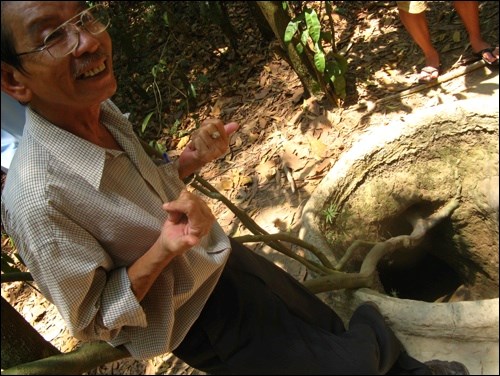During of my travels through Asia, I spent a month in Vietnam, travelling from the south of the country to the north. As a tourist, the country was great fun to visit, though the massive developments in the tourism industry took away from the adventure and uniqueness of the experience somewhat.
In my one month there, I probably spent a little over half a week in transit. I memorably took a bus ride that was around 48 hours long, with one eight-hour break, several transfers and significant time wandering around small towns aimlessly. At one point in the bus journey, I had to take a ride on the back of a motorcycle going around 80 km/h, past midnight, in the rain, with around 50 pounds on my back. It would have been a white-knuckle ride, except that there was hardly anything for me to hold on to besides the driver.
My frenzied travel schedule, and the setting of the trip, meant that I many hours reading, mostly on the Vietnam war. Of course, the war has a different name in Vietnam (the American war), and its significance in Vietnam is different from its significance in the United States. To Americans, it was a deeply polarizing event with a cultural impact that is impossible to overstate. The war divided Americans by generation, inspired the creation of countless pieces of art (a great example is the Curtis Mayfield album "Back to the World," in which "the world" meant the United States to returning soldiers), and polarized the political landscape.
The effects on Vietnam were different, however. For one thing, the "American war" was not a monolithic conflict. So much of the literature around the war ignores the fact the Vietnamese had fought off French colonial forces for 10 years, eventually defeating them in a dramatic, bloody conflict that ended in 1954. The subsequent invasion by U.S. ground forces was, by many Vietnamese, seen as a continuation in a long line of foreign invasions.
Everyone knows a little bit about the Vietnam war. But it's important to emphasize several things that are often left out of the discussion of the war.
Firstly, the death toll. Regardless of the exact numbers, the truth is that 10 per cent is a conservative estimate of the proportion of the Vietnamese population who died. Secondly, while everyone is familiar with agent orange, the defoliant used by the U.S. military, fewer people are familiar with its true effects on the country. Twenty per cent of Vietnam's forests were sprayed with the chemical, which was known at the time to be contaminated with a dioxin considered to be "one of the most toxic chemicals ever synthesized by man." Forty per cent of the spraying was done to agricultural land, killing, crippling and maiming non-combatants.
When the war ended, the United States had failed in their objectives - Ho Chi Minh quickly took control of the entire country. The "domino theory" was also proven false - the Vietnamese resisted Chinese influence, and even fought a brief border war with China in 1979. If anything, the war had made the Vietnamese more likely to fall under the control of the Chinese government, by weakening their military.
And other countries had been dragged into the war. More bombs were dropped on Laos as part of the Vietnam campaign than were dropped in the entire Second World War. More bombs were dropped on Cambodia than were dropped in the Pacific campaign of Second World War.
Much of this I learned in Vietnam, much of this I learned after my trip. For example, I heard from German tourists about a part of Laos that is a major tourist attraction because U.S. bombing left it looking as cratered as the surface of the moon. I toured a prison used by U.S. soldiers, the infamous "Hanoi Hilton" where John McCain had been waterboarded, and even saw the flight suit he had been wearing when he was captured. And I read, intensely, about the experiences of American GIs and reporters who described their descent to hell in harrowing detail.
I thought I had understood a little about the Vietnam war before I travelled there, but the picture was always muddied a bit with talk of glory, action and excitement. The picture that emerged after my travel was infinitely bleaker. Outside of 小蓝视频east Asia, we relate to the Vietnam war with art, historical documents, photographs and videos. Within Vietnam, the war is still alive. In museums throughout the country, one can gaze upon jars filled with stillborn, horrifically disfigured babies who were doomed before they were born by the dioxin in agent orange. One can still see the wreckage of downed B-52s in Hanoi or tour the Cu Chi tunnels. One is constantly reminded that the damage done to the country didn't end after the Americans left - landmines claimed the lives of farmers and livestock, and agent orange devastated agricultural output. And an entire generation had been ravaged, killed, incapacitated or injured.
Seeing the sights that I saw, reading the stories I read, I emerged from my Vietnam trip more proud of Canada than I had ever been. Regardless of Canada's faults, regardless of the countless injustices we have visited upon our own population, regardless of any of Canada's failings, the fact we did not send young men to die meaninglessly in this hellish conflict made me, for maybe the first time, deeply proud of my country. It's a feeling that has come and gone over the years, but never returned with the same intensity.
But speaking to Iraqis about their own experience in the recent "invasion," as they termed it, returned some fraction of that pride to me. Once again, Canadians chose not to involve themselves in a horrific conflict that devastated a country for no concrete purpose.
I hope and pray that our government allows me to keep this pride.




